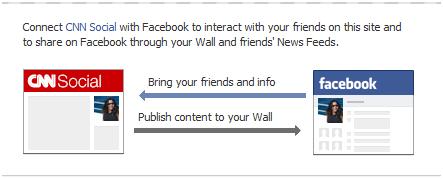The online world’s been buzzing about the bold announcements at Facebook’s third f8 developer conference yesterday, where Facebook CEO, Mark Zuckerberg discussed his vision of the new social web and unrolled the next version of the Facebook platform.
While this conference was primarily aimed at developers, here are 3 announcements that have significant implications for businesses and users – Social Plugins, Open Graph protocol, and Graph API.
Social Plugins are the “like”/“recommend” buttons or widgets that allow users to share content from any site with their social network. Here’s the “like” button on Levis.com, which is one of the 30 launch partners along with Microsoft and CNN.com.
The Open Graph protocol is the rebranded Facebook Connect but “on steroids”. Developers using this protocol will enable users to “like” and “recommend” content anywhere on the internet as long as the Social Plugins are enabled on that site.
This allows users to share information back to their Facebook social hub without ever leaving the page or website. Facebook claims that this will enable companies/website developers to,
“ integrate your web pages into a user’s social graph and also allows your pages to be seen across Facebook: in user profiles, within search results and in News Feed.”
This move brings users closer to the “semantic web” than ever before, where any website can automatically recognize the user and serve up relevant content without requiring multiple logins. With Open Graph, all information on user’s preferences and social graph is delivered directly to the website (from Facebook) so the users can effortlessly share and recommend their favorite products to their social network, all of which is great for marketing.
Graph API reflects Facebook’s push towards a more open social web and putting the onus back on the users to pro-actively manage their privacy settings but it remains to be seen how users feel about that responsibility once this is rolled out widely. Facebook is simplifying all its individual privacy permissions into one unified permission.
However, this convenience will come at a price – users may not have much control over how much of their data should be shared with an external site and how their data is being shared or used by those sites.
What adds some more complexity is that Facebook is asking their developers to have their own privacy policies which means that users will have to be diligent in reviewing the policy for every site where they have opted to share their data, it’s not Facebook’s responsibility.
“In addition, with explicit user consent, you can use their data for purposes beyond displaying it back to the user. However, you’ll now need to have your own privacy policy and enable users to delete all of their data from your app.”
Also, for company websites (where this is enabled), it’s not clear if there’s any responsibility on part of the company to safeguard the user information, given there is personal data flowing between Facebook and other sites, which raises some privacy concerns.
These social plugins don’t provide option to “unlike” or share negative reviews of products, which is great for marketers, not so good for consumers. I believe this will complement rather than replace the existing reviews/ratings feature which are widely implemented on most retail sites.
This move also strengthens Facebook’s control over any and all social data, which will reside on Facebook hub not on the company’s website so if you’re a business, you will be dependent on Facebook for access to that social data.
Some additional great news for businesses is that Facebook will be able to provide analytics on their users’ social behavior, which would help in more targeted marketing. However, this move towards “social web” makes Facebook the de facto owner of all social data on these users and could potentially charge for access to this data in the future. This is a bit scary and as MG Siegler points out,
“that’s a lot of power for a still-private company to have.”
Overall, this is a game changing move for Facebook, which is already nearing a formidable 500million visitors per month, according to ComScore. But as they say the Devil is in the details and many of the questions/concerns will be hopefully addressed as this becomes widely deployed.
Here are some great write ups, if you want to learn more:
- “Facebook Open Graph: What it Means for Privacy” by Christina Warren, Mashable
- “I Think Facebook Just Seized Control of the Internet” by MG Siegler, Techcrunch
- “Facebook, entire web will be social” by Liz Gannes, GigaOM
- Official post from Facebook




Pingback: uberVU - social comments
Pingback: Daily Digest for April 23rd ‹ SmediaC - Social Media Community Strategy – New Media And Community Strategy
Facebook’s vision is conspicuously self-promoting – not a best practice in social media. Success will lie in the value the added functionality will bring to FB users. The most significant risk to their success hinges on their decision to delegate security policy to third parties. With questionable privacy and security, users will be less likely to adopt the new functionality. Things change quickly in a Web 2.0 world and FB needs to fear a rising competitor whose vision aligns to market and user demands vs. the megalomaniacal visions of Internet domination.
Said with love.
Now pardon me while I got check my FB wall…
LOL..very nicely put 🙂
Facebook is goliath and as such, it is only motivated by profit. There was one rising star called FriendFeed, which was (unfortunately) bought out by Facebook, so it doesn’t have much to fear..yet. Many users are not as enlightened as you and/or are severely addicted to Facebook to do anything about it.
Pingback: Facebook Privacy Debate Heats Up but do Users Really Care? « Marketing Mystic